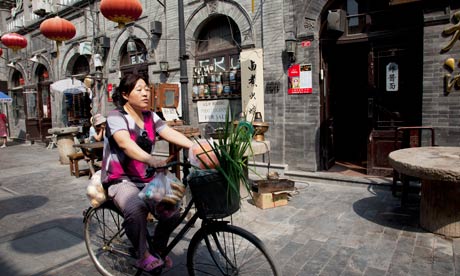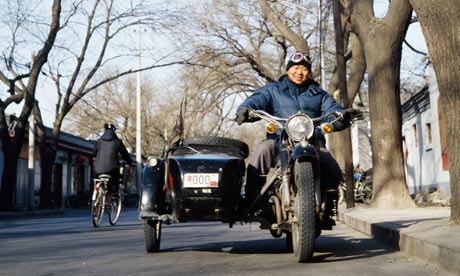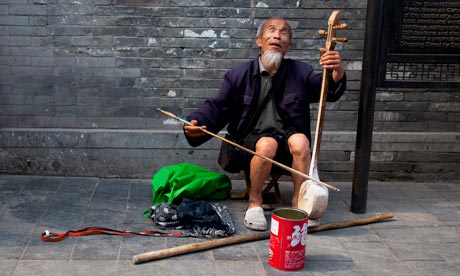| Home > Living In China |
Focus: Sight in Beijing Street
In China's capital city, ancient neighbourhoods are being flattened in the name of progress. Author Tahir Shah takes a motorbike-sidecar tour through the disappearing hutongs.

'Another couple of years and all the history will be gone!': a preserved hutong in the Xuanwu district. Photograph: Mike Kemp/In Pictures/Corbis
There's nothing that Chen Maa can't tell you about bicycles. For 40 years he repaired them from dawn til dusk, in a battered lean-to he built himself a stone's throw from the Forbidden City. Then four years ago, as the Chinese capital was made ready for the Olympics, a wrecking ball swung in a single arc and wiped his workshop away.
"Everyone knew me," he says proudly. "They called me 'The King of the Spokes'." Chen Maa holds up his fingers for me to examine. His calluses have calluses. "Look at them well," he urges. "You don't get hands like that without tasting hardship."
Where the workshop stood there is now a wide stretch of road gridlocked with cars. Chen Maa squats in the gutter and rubs his eyes with his thumbs. "I come here from time to time," he says softly. "I don't know why, but it makes me feel warm inside – warm with memories. I'm a dinosaur. No one wants bicycles any more. Why would they, when they can have cars?"
It's not only Chen Maa who's tasted change. Everyone living in Beijing has experienced it, and does so on a daily basis. The city is sloughing its old skin like a giant dragon that's been asleep for centuries. And the result is a total reconfiguration of the system. In this brave new world there's one clear goal: opulence and luxury on a monumental scale, albeit the preserve of those with cold hard cash.
Most of the foreigners you meet in Beijing point to the forest of cranes on the skyline and shake their heads in despair. A banker friend who's been living in the capital for years took me to his 38th-floor office window and did just that.
"The city officials ought to be taken to The Hague for crimes against humanity," he said bitterly. "One day they'll wake up and realise that they've destroyed a treasure."
"But surely it's all in the name of progress," I replied limply.
My friend's face turned scarlet with wrath and his hands began to tremble. "Another couple of years and all the history will be gone!" he snapped. "If you don't believe me go and have a look at the hutongs for yourself."

Travelling by sidecar
A little later I found myself in the sidecar of a Second World War BMW. Well, this being Beijing, it was a Chinese copy of a Russian copy of the German original. Crouched over the handlebars was an enthusiastic young Frenchman named Gael. Slaloming visitors through the maze of old hutongs is how he makes a living, giving them an experience that gets seared into their memories. Zigzagging at breakneck speed past washing lines and bent old men, hookers and their pimps, and little children with angelic faces, we seemed to cleave our way back in time.
The faster we went, the faster my mind worked on it all. By the end of the journey I had what I thought were answers. Staggering out of the sidecar, I got a flash of central London – where the Georgian Regency reshaped vast swathes of a city whose classical architecture we hold so dear. The same went for Paris under Haussmann – grand sweeping boulevards that are at the heart of Gallic national pride, created at a forgotten cost.
By good fortune I was staying at the Opposite House, a new colossus of a building in the Chaoyang District. If it were anywhere else, the people who worked there would be gloating. But modern China is awash with architectural marvels, which of course shouldn't be any surprise. After all, the dragon that sloughs its skin today is the very same that brought us the Great Wall yesterday.
My banker friend phoned late in the afternoon. He steered the conversation on to the glory of hutongs, all cramped and forlorn. Then he asked about the hotel. I scanned my enormous room – sleek lines, calm serenity, all of it peppered with amusing quirks of contemporary design, not to mention enough space to swing a tiger by the tail.
"It's horrid," I lied. "Very horrid indeed."
The banker expressed approval and said he'd be right over for some drinks.
After a good many single malts in Punk, the basement bar, he led me outside to inspect Sanlitun Village, the pristine plaza of luxury shops that's sprouted up adjacent to the hotel. On my only other visit to Beijing, I spent most of my time lost in the labyrinth of the infamous Silk Market, buying pirate DVDs of just about every movie ever made. So my memory of Chinese shopping was one based not only on discount fakes, but one in which space simply didn't exist.
The Sanlitun Village wallows in the kind of neat designed landscape that's such a novelty to the nouveau riche of modern Beijing. There's every imaginable brand name in the line-up, from Alexander McQueen and Balmain to Lanvin, Mont Blanc and Versace. But the brands aren't as much as a thrill to the visitors as the pure sense of expanse, an expanse that only those who've made it can afford to populate.

A blind man busking on Yandaixiejie Street – which mean Tobacco Pipe Lane. Photograph: Mike Kemp/In Pictures/Corbis
The next day I was reading an item in the local English paper about how the latest zillionaire in town made it big by renting out wrecking balls. But even he, the article confessed, feared the day when there was nothing left to wreck. Just as I finished reading the piece, a student of English approached me, hoping for conversation. I asked if he was bothered by the fact that all the old buildings were torn down.
The student stared at me blankly, then blinked. "We don't need history in a material way like you do," he said, "because we hold our history in our hearts."
Not long after my conversation with the student, I flew over to Hong Kong. I was still thinking about change and Chinese culture, and about space as well. On the surface, the former British colony is so very different from the mainland, but it makes for a fascinating lens through which to peer into the future of China itself.
Roam around Hong Kong and you can't help but be struck by the sense of self-confidence, mixed with a long-established grounding in personal wealth. I've never seen so much bling or so many skyscrapers jammed into such a confined space. But at the same time, I was deeply impressed at how Hong Kong has held firmly on to its hybrid culture. As with mainland China, the broad strokes may change but the details stay the same.
At the Wet Market, I got chatting to a woman who was prising shells off live turtles. She said there was no meat like fresh meat, and that even though the market wasn't as ramshackle as it once was, its soul had remained unchanged. I asked if she was fearful of change. She grinned a big toothy grin, and ripped the shell of another turtle with her hands.
"If you can't keep up, you'll get sucked under," she said. "What's the good of selling turtles if no one wants them any more? If they don't want these, I'll sell catfish, and if they don't want that, I'll sell eels instead."
I thought back to Chen Maa, King of the Spokes, and how he'd been left behind. He hadn't kept up in a city where all the old alleys are being replaced by wide avenues, a place where bicycles are things of the past. The woman picked up a live shell-less turtle and chopped it neatly down the middle with a cleaver. I gulped emotionally.
"Change is good," she said, bringing the cleaver down again. "Without it we would be standing still."
Custom
 more
moreWeb Dictionary
Primary&secondary
Beijing National Day School
Beijing Concord College of Sino-Canada
Brief Introduction of BCCSC Established in the year 1993, Huijia School is a K-12 boarding priva...Beijing Huijia Private School





 print
print  email
email  Favorite
Favorite  Transtlate
Transtlate 







